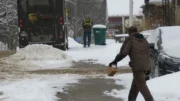Striking a balance between a static revenue stream and the need to pay for city operations was “a real challenge this year”, but the City of Oil City has managed to pull it off.
“It’s been tough trying to put these finances together but our employees have done an excellent job keeping expenses down,” city manager Mark Schroyer said Thursday in an interview prior to city council’s tentative adoption of the budget. “Our department leaders kept our head above water by holding down the costs.”
The final figure for the 2021 budget is pegged at a hefty $24,913,839. That amount includes all city accounts from sewer and water costs to police and fire department expenses.
The budget doesn’t require hitting the city’s $1.2 million general fund reserve or its $157,477 in a carry forward cash account. The reserve fund is “in good shape and is where it should be,” Schroyer said.
Bills are higher
Two entries in the budget jumped for next year.
The city’s liability insurance relating to property and vehicles skipped up $8,000.
“We anticipated it would be a bit higher and budgeted for it,” said Schroyer. “Still, the increase didn’t help us any.”
A big hike was noted for workers’ compensation which went from a $158,039 premium this year to $199,947 for next year.
“We got knocked out of the water on that one,” said Schroyer. “And while our claims were minimal, there is one significant one that is expensive.”
One key budget figure resulted in a lower than feared premium. After years of significant annual increases, the health care coverage for city employees went up 2.4 percent for next year.
Some cuts made
The proposed budget lists two cuts in monies earmarked for what are described in the spending plan as “donations.”
The Oil City Library, now part of the three-library Oil Region Library Association, saw its annual contribution from the city fall from $184,000 to $180,000. The allocation allows all city residents free access and library membership cards to the Oil City Library.
The city’s Main Street program funding was cut from $40,000 to $35,000 for next year.
“Those cuts were necessary because of the general fund revenues that are getting tighter and tighter,” said Schroyer. “We had to make modest cuts. Those (allocations) are not sustainable with the stagnant revenue we have. At some point, we have to further cut expenses or increase revenues. It’s concerning.”
Included in the projected budget is funding for the city swimming pool, closed this year because of pandemic-related health directives.
“We budgeted for it next year. Our plan is to open it in June and there is no change in that decision as this time,” Schroyer said.
Two union contracts will expire in 2021. Negotiations will begin next year for labor agreements between the city and its firefighters and public works employees.
The city’s contract with the police expired in 2019 and hasn’t been settled. Schroyer said it is “heading towards arbitration” to reach a settlement.
Revenues are static
Despite disruptions in business, education and more due to the pandemic, the city fared well in terms of finances, said Schroyer.
“There was no disruption in revenue to the city due to the pandemic and we were surprised,” he said. “One reason for that is that a lot of people in Oil City are on fixed incomes like pensions, retirement, public assistance and their income stayed intact. Overall, our residents have paid their taxes and other obligations. So, there was no significant impact from the pandemic on the budget.”
While the 2021 budget will be the sixth consecutive city spending plan that won’t require a hike in property taxes, that trend may not continue, said Schroyer.
“In 2022, we will have to take a hard look at our revenues. There has been no increase in revenue those six budgets and that is not sustainable. Usually, you can expect a two to three percent uptick in revenues to keep up with inflation. We don’t have that. But, overall, we’ve been aggressive in capital improvements, infrastructure, paving. I think we’ve done a pretty good job in bringing Oil City up to where it should be,” Schroyer said.




































